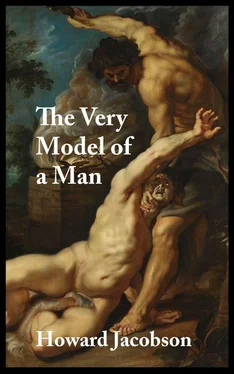Another wintry sea-bird laugh from Eve. So this is where we’re leading, she said. You have a system for getting proof.
Or disproof.
She pondered it, then said: You have been busy lately.
He took less time over his reply. So have you, he said.
I still count the minutes of the silence between them, and wish it had been longer, even though, in truth, it was long enough for a man’s wife to have gone aside, and to have committed trespass against him, and all the rest of it…
Abel was the lucky one, the shrewd one. He fell asleep on my back, and so missed the ignominy of what ensued, unless you call the ignominy of what ensued the next twenty years.
Particularly, though, he missed our father with a little f — with an f so little it was barely there this night — descending from his earlier victory over our word-mad Maker into a slush of mouldering ritual: oaths, curses, potions, bitter brews of dust and water which would make the belly of a bad wife swell, and a guilty woman’s thigh rot like a fluke-infested sheep and fall away like a broken branch. For in the measure that we measure is it meted out to us, he said. Thy transgression began with thy thigh and proceeded to thy womb; therefore shalt thou be punished, like to like.
This was not our language or our thinking; it was not our spirit or our procedure. How it could be that some things seemed obsolescent to us, although we were the first family, I cannot say. But it was so. And here is another reason I suspect an alien instrumentality: we were primal, but we were not that primal.
Nor was my mother that deaf to abrupt changes in my father’s use of the personal pronoun. At first it had been her belly and her thigh — the transgressive parts of the suppositional wife of the hypothetically jealous husband. Now it was thy womb — which meant that all supposing and hypothesising had stopped.
Before we talk about me, my mother said, can we clear up the identity of this man?
This man?
The original defiler. The reason for the punishment. The excuse to have a woman swallow dust.
Not dust, my father corrected her, just bitter water. And it is a trial, not a punishment. If the woman is innocent –
Yes, yes, my mother understood, her thigh stays on. But this man… this man not my husband… who would that be? What man not my husband has the breeding earth bred for me?
If my father heard a double reproach in this — refutation of his slander and regret that the thing of which she stood accused could not be true — he was meant to. In that hour he learned what a fierce weapon you hand the blameless when you charge them with unchastity. ‘Where was my opportunity?’ is a protest with a thousand blades. And jealous flesh cuts easily.
That might have been why he seemed to want to retreat. When I say man, he said…
You don’t necessarily mean man? I see. What about when you say defiled?
He grunted. He was sitting with his back against a tree, pulling absently at bark that fell around him like shredded rags. My mother was sitting opposite him, her hands folded in her lap. They were close enough to touch toes.
She took his grunt to mean that when he said defiled he meant defiled.
Yes, but by whom? she asked. Then, remembering that when he said man he did not necessarily mean man, she added: Or by what?
I was relieved that in moving so quickly from the idea of man to the idea of thing we had bypassed silently the idea of boy. Throughout the exchange of hostilities concerning the existence or not of a creature man enough to commit trespass with my mother, I had held my breath, conscious that a stray missile could easily hit me. I was man enough. Man enough to think I was man enough anyway. And to be wondering what other provision, if not this one, Great Creating Nature had made for the end of my boyhood.
Good to be off whos and on to whats, then; except that here too there were dangers. Would my father be rash enough to risk the wrath he had stilled only a few hours earlier, and point an accusing finger at the What of whats? Had he somehow (and I will tell you how) got to know of Semyaza? Did he have a list of abominations to go through that even I knew nothing of?
There is a way out of this, I was relieved to hear my father say. All you have to do is suffer the trial.
(Suffer it! I whispered. Suffer it for all our sakes!)
You want me to swallow dust?
It is only clouded water, he reminded her.
You want my thigh to rot?
Only if you are guilty.
You should not want it even if I were guilty.
I do not want it, my father said. I tremble for it. But if you are innocent you have nothing to fear.
But much to resent.
He had stopped listening to her. He was on his feet, looking for a vessel, looking for water, scooping up dust.
Here, he said. Drink.
She put her hand out. Will there be an end of this if I do?
There will, he said. But I detected the trembling he spoke of in his voice.
And do you accept that though these waters of bitterness may have no effect on my belly or my thigh, they will leave an acid deposit around my heart?
If you have not misconducted yourself the waters shall pass cleanly through you.
You do not know the meaning of your own trial, my mother said.
And because she would be sour of soul, because there was no other man for her to go aside with but my father and yet she was still accused, because the angel Semyaza had come in light and gone in paraffin, she drank.
And her belly did not swell and her thigh did not rot, but she never again — Azael had seen to that — cartwheeled with my father in the moonlight.
Azael?
Who else? I have no proof. Angels leave no proof. But only a member of the all-male choir invisible could have devised such a stratagem for the withering of a woman’s body, could have anticipated the distension and disfiguration with so much zest, and found such torment for the conventionally unclean minds of husbands — yes, all right, and sons — to boot.
A two-headed cruelty, punishing both human sexes equally.
Whether Azael was acting solely on his own initiative, or settling an account for Semyaza, or in some way settling a score with Semyaza, or whether he had been on an undeviating mission all along, carrying out the express instructions of the Great Choirmaster Himself, I cannot pretend to know. Nor can I do any better with such practical questions as when Azael approached my father, what manner of address he employed, what form he chose — whispering conscience or diaphanous visitant or merely flaking bird.
None of this matters. Just trust me when I tell you that there is no more remorseless or retaliative envy in the universe than the envy matter excites in spirit.
Though what good I do saying that in Babel, I can’t think.
He has taken to bathing and barbering to excess.
Four baths at the hands of refugees from Anatolia in a single afternoon. Three shaves in the chairs of journeymen from Sodom in a single morning.
‘I cannot get the mildew off myself,’ Cain complains.
Seeing him coming, the barbers talk among themselves. The consensus is that a clean chin is not really what’s he after — he wants a clean slate.
He thinks he can come in old, they say, and go out new.
A new thing.
He knows he is becoming an object of broad amusement. The Anatolians slap him harder on each visit, assuming this is the reason he returns. The shavers of Sodom bury him under hot towels and make faces.
But the mildew still grows on him.
He is cobwebbed, too. Primordial. Stagnant. In Yiddish — though of course Cain has no Yiddish — farshtinkener, farfoylt.
Читать дальше











